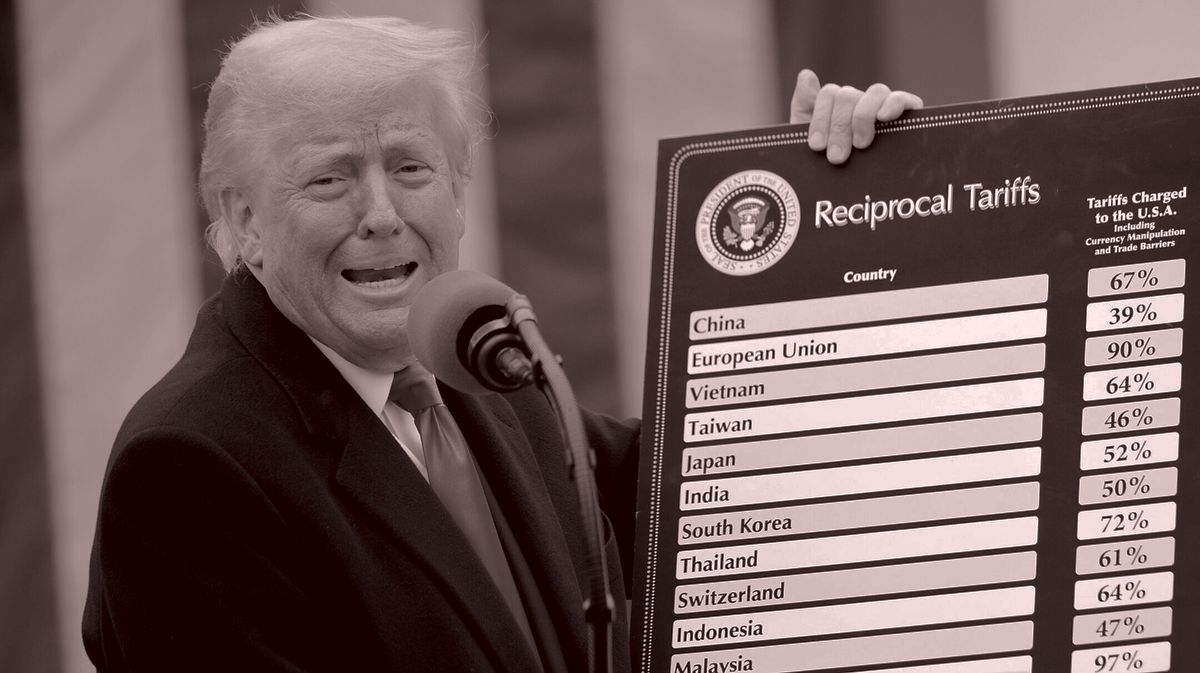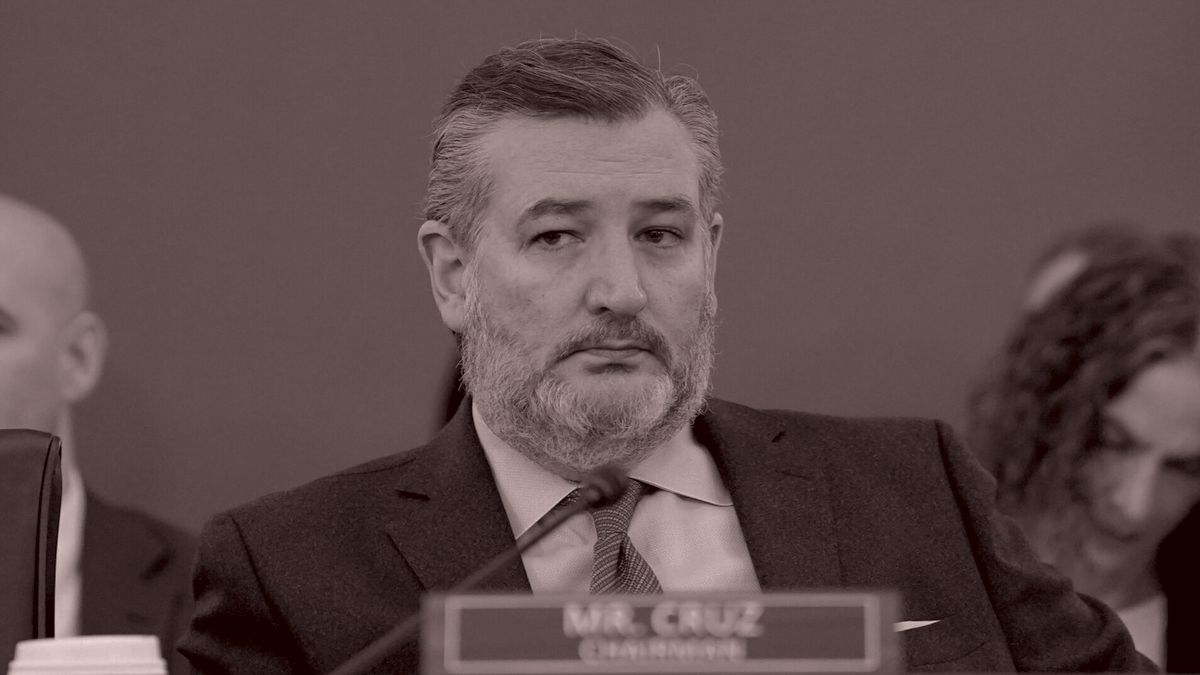Hello and welcome back to The Best & The Brightest on this rainy and chilly Monday. I’m Leigh Ann
Caldwell with you on yet another day of Donald Trump’s post-Liberation Day blues, which will soon get Republicans labeled as the Tariffs Party if members continue to sit on their hands.
Today, my partner Abby Livingston has the latest on the tariff politics on the Hill—the growing furor in the Senate, murmurs in the House, pre-’26 blue wave enthusiasm among Dems, and the stone-faced posture in the White House.
But first…
|
- Tax
war preludes: In the last week before their two-week Easter recess, the House Republican leadership is focused on passing the budget framework adopted by the Senate early Saturday morning—another attempt at the crucial first step in advancing their agenda. Predictably causing problems for Speaker Mike Johnson this week is the House Freedom Caucus, whose members are threatening to vote against the Senate’s resolution since they say it cuts too little and adds too much
to the deficit. The Senate version, you see, requires a measly $4 billion in spending cuts, and allows for a whopping $5.8 trillion in tax extenders, which would allow them to make the tax cuts permanent.
The $4 billion in cuts is a low number the Senate devised to give Republicans more latitude when they craft the details of their bill. But fiscal hardliners worry that it gives Republican “squishes” the option to opt out of deeper cuts. “They’ll make $4 billion worth [of cuts],”
Rep. Andy Harris, the Freedom Caucus chair, who wants trillions cut, told me. “That’s all I trust them for.” Johnson spent this evening speaking to the Freedom Caucus at their weekly Monday night meeting in an effort to secure their support for the measure. “It’s a big lift,” one Republican House aide said beforehand.
The House Republican leadership would prefer to not make changes to the Senate resolution, since that would require sending it back to the upper chamber yet again to
reconcile the two versions, eating up more time and further exposing divisions within the party. White House aides have already gotten involved in the negotiations, one Republican aide said. And President Donald Trump weighed in Monday evening to offer his “Complete and Total Endorsement and Support” of the Senate resolution and urge that there is “no
better time than now to get this Deal DONE!”
What might be some good news for Johnson is that Texas Rep. Jodey Arrington, the chair of the Budget Committee, actually seems amenable to supporting the Senate resolution at this stage, at least. He no doubt rattled Johnson with a weekend statement calling the budget framework
“unserious and disappointing,” but if you read it closely, the language suggests he’s simply posturing for steps down the line, not necessarily vowing an immediate “no” vote. “I am committed to working with President Trump, House leadership, and my Senate counterparts to address these concerns and ensure the final reconciliation bill makes America safe, prosperous, and fiscally responsible again,” Arrington wrote. Translation: He’s drawing a line in the sand, saying he will only support a bill
that includes at least $1.5 trillion in spending cuts when they actually fill in the details down the road.
It’s also worth noting that the Senate resolution would lift the debt limit—the ceiling on federal borrowing we’re set to hit at the end of the summer—to an astonishing and unprecedented $5 trillion. Historically, when Democrats propose lifting the debt ceiling, Republicans have threatened to shut down the government. But now, despite the complaints of a handful of Republicans like
Sen. Rand Paul, who voted against it, most are looking the other way.
|
Now here’s Bill Cohan on the Wall Street hunger games:
|
|
|

|
William D. Cohan
|
|
- The one word I heard over and over
again on Wall Street this past week was “shitshow,” and with good reason. U.S. equity markets lost some $7 trillion in value on Thursday and Friday after Donald Trump announced tariffs of anywhere between 10 percent and 54 percent on virtually every country in the world, many without rhyme or reason. In a cheery note, Bruce Kasman, the chief economist at JPMorgan Chase, increased the probability of a recession this year to 60 percent, up from 40 percent. “This
big beautiful economy that actually was rolling pretty good with jobs and inflation coming down. [This] feels more like the Game of Thrones red wedding,” the longtime investment banker and Biden ally Robert Wolf said on Fox News, referring to a scene in which all the guests were brutally murdered. “I mean, it’s not going well.”
The panic stems in part from the widespread confusion over whether the so-called “reciprocal” tariffs Trump imposed—in
fact, the tariff rates were calculated based on the U.S. trade balance with each country, not trade barriers—were intended to be an opening bid to negotiate more than a hundred new bilateral agreements, or rather were expressly intended to be a semi-permanent new source of revenue. According to one prominent M&A banker, C.E.O.s are nervous, very nervous. “The concern goes beyond tariffs,” the banker said, “to our economic framework in general, and what it means to upset the world order,
and what it means politically. There is a concern that not enough people in the White House understand the implications here.”
Read the whole thing here…
|
|
|
Republicans are now, for the most part, standing by Donald Trump in his trade war. But
dissent is brewing within the party, and Democrats are salivating at their own newly brightened prospects.
|
|
|
Wall Street seemed to be of two minds on Monday, with stock markets churning up and down as investors take
opposing sides of what is essentially an unknowable multitrillion-dollar question: Is Donald Trump’s trade war the commencement of bilateral negotiations or simply the end of the U.S.-led world order? In Washington, too, Republicans are currently divided over whether to give the president room to maneuver—“the runway to do what it is he was elected to do,” as House Speaker Mike Johnson
put it obsequiously today—or to assert their legislative authority over tariffs, reclaiming an economic weapon that Trump is now wielding with impunity.
In my conversations with lawmakers during the past few days, the prevailing sentiment among most Republicans has been that Trump needs “room to
negotiate” with foreign leaders on tariffs. Especially in the House, there are few Republican members willing to criticize the president. But dissent has been brewing in the Senate. Over the past 72 hours, Ted Cruz, Ron Johnson, and Mike Lee have all pleaded with Trump, mostly via the media, to use his leverage to cut deals to reduce trade barriers—even as Trump continues to insist that tariffs are his end goal, not a negotiating
tactic.
A secondary faction of Senate Republicans is now openly agitating for an intervention. Since its introduction last week, seven Senate Republicans have signed on to a bipartisan bill to restore Congress’s constitutional power over tariffs, which would give lawmakers the ability to
“end tariffs at any time by passing a resolution of disapproval.” The measure, co-sponsored by Republican Chuck Grassley, has attracted the support of perennial rebels Lisa Murkowski and Susan Collins, as well as Todd Young, Mitch McConnell, and Thom Tillis, who’s facing a difficult reelection next year. Republican Jerry Moran of Kansas is also a co-sponsor.
Later on
Monday, the White House budget office reportedly sent a memo to congressional offices arguing that the bill would “severely constrain” the president’s executive authority and hurt national security. The administration also warned that Trump would veto the bill if it ever reached his desk. In a separate missive on Truth Social, Trump instructed
Republicans in his signature style: “Don’t be Weak! Don’t be Stupid! Don’t be a PANICAN (A new party based on Weak and Stupid people!).”
It’s worth highlighting some of the geographic dynamics at play here. Grassley and Moran, who represent Iowa and Kansas, respectively, are both accountable to voters in the agricultural sector, which is particularly vulnerable to the downstream effects of the tariffs. (During his first administration, Trump ultimately called forth billions of dollars to
subsidize farmers who would otherwise have faced bankruptcy as a result of his trade policies.) Republican Reps. Don Bacon of Nebraska and David Valadao of California, who are introducing the House version of the Grassley bill, also represent districts with a major agricultural presence.
Democratic members have been telling me for weeks that the trifecta of the tariffs, the elimination of the agricultural exports supported by USAID, and the declining
prospects of passing a long-term Farm Bill has helped them garner their most receptive audiences with agricultural workers in years. Perhaps more farm-state Republicans will feel the political pinch. For now, however, Republican insiders tell me they don’t anticipate a groundswell of other members joining the anti-tariff opposition. Asked about Grassley’s bill, Senate Majority Leader John Thune told reporters in the Capitol today, “I don’t think that has a future.”
|
The Democratic appetite for obstruction is growing at a ferocious clip. On Monday, Senator
Brian Schatz announced that he’s placing holds on 50 more Trump administration nominees—bringing his total to 300—in response to Trump’s tariffs. But the response from the progressive wing has been somewhat muted. After all, many Democrats have themselves advocated for tariffs over the years—many challenged Barack Obama when
he pushed for a massive trans-Pacific trade deal. Dems I spoke to today were quick to point out that their idea of a healthy tariff policy is “slow and steady”—not the shock to the economic system we’re currently witnessing. Fair enough, but these Dems aren’t principled free trade advocates, either.
Elsewhere in Washington, Democrats who work on campaigns have been astonished by the apparent reversal of their political fortunes in just a few weeks—specifically, the Wisconsin Supreme Court, where the liberal candidate, Susan Crawford, prevailed by double digits, followed this weekend by massive anti-Trump protests around the country. After a sluggish start to Trump Redux, they argue, the party is beginning to find its momentum.
The tariff drama comes at a fragile point in the 2026 cycle—namely, recruitment season. To improve the outlook for the midterms, both parties need to persuade strong candidates to run for
office. Sustained economic chaos could weaken recruiting efforts on the Republican side, while reinforcing the burgeoning Democratic enthusiasm. We’ve already seen Democratic candidates announce campaigns for the House and Senate—both in the immediate aftermath of Trump’s inauguration, and in the last few weeks, as the fundraising quarter draws to a close. We’ll get more clarity in early July, which is one of the last—and busiest—windows to announce.
Many sources I spoke to this week
argued that it is inevitable that Democrats retake the House next year, given the historical pattern of the president’s party losing seats in the midterms, not to mention the energy in Wisconsin last week. On top of that, there’s a growing consensus in Washington that the House majority is off the table for Republicans if Trump can’t stabilize the economy quickly. The question then becomes how big of a wave is headed for Republicans. Is their Senate majority in jeopardy,
too?
Naturally, Democrats are delighted when you ask them to speculate on the midterms. On Friday, one Democratic politician privately predicted to me that any House Republican in a district Trump carried by fewer than 10 points is in trouble. This analysis may have been as unscientific as the Trump tariff formula, but it was rare to hear this kind of confidence from a Democrat even a few weeks ago.
It’s important to remember that this generation of Democrats is used to chaos and
destruction. After all, Obama spent his entire first term cleaning up the economy after the Wall Street crash on George W. Bush’s watch. Joe Biden started his term faced with the still-recovering Covid economy. As one beleaguered Democratic, a former Hill staffer who had a front-row seat to the 2008 bailout, told me, “They break it. We fix it. We are back to square one.”
|
|
|
Join Emmy Award-winning journalist Peter Hamby, along with the team of expert journalists at Puck, as they let you in on the conversations
insiders are having across the four corners of power in America: Wall Street, Washington, Silicon Valley, and Hollywood. Presented in partnership with Audacy, new episodes publish daily, Monday through Friday.
|
|
|
Unique and privileged insight into the private conversations taking place inside boardrooms and corner offices up and down Wall Street,
relayed by best-selling author, journalist, and former M&A senior banker William D. Cohan.
|
|
|
Need help? Review our FAQ page or contact us for assistance. For brand partnerships, email ads@puck.news.
You received this email because you signed up to receive emails from Puck, or as part of your Puck account associated with . To stop receiving this newsletter and/or manage all your email preferences,
click here.
|
Puck is published by Heat Media LLC. 107 Greenwich St, New York, NY 10006
|
|
|
|






















